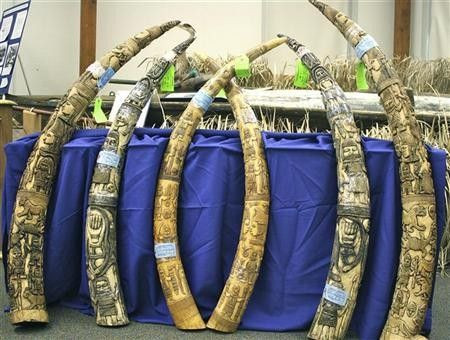Kenya Delivers Record Fine To Chinese Ivory Smuggler

A Kenyan court delivered a record-setting sentence to a Chinese ivory smuggler on Tuesday, making him the first person convicted under Kenya’s strict new anti-poaching laws.
Tang Yong Jian, 40, was given the choice of paying 20 million shillings ($233,000) or spending seven years in jail after pleading guilty to charges of smuggling. Jian was arrested in Nairobi last week while attempting to smuggle a 7.5-pound ivory tusk from Mozambique to China.
The Kenya Wildlife Service believes that Jian’s harsh sentence will be a major deterrent to poaching, which has seen a sharp uptick in recent years.
"It's a landmark ruling that sets a precedent for those involved in smuggling," Paul Udoto, spokesman for the Kenya Wildlife Service, told AFP, continuing to say that the new law will make "killing of wildlife a high-cost business."
"It's a remarkable precedent," Udoto said, explaining that poachers and smugglers previously recieved only "a slap on the wrist." Kenyan park rangers are typically outnumbered and outgunned by powerful poaching gangs, but Udoto believes this step could help turn the tide.
"It's very motivating for our rangers to see poachers lose a lot of money and spend long terms in Kenyan prisons," he said.
Just hours before magistrate William Oketch delivered Jian’s sentence, another Chinese smuggler was arrested at the Nairobi airport carrying three ivory necklaces, two ivory bracelets, 10 pendants and two rectangular blocks of ivory. The passenger was traveling from the Democratic Republic of Congo to China.
In recent years, poaching has increased throughout Africa as the international demand for ivory has risen as well. Though ivory trading was banned in an international agreement in 1989, the illegal ivory trade continues to thrive on demand in Asia and the Middle East.
In 2012, the number of elephants poached in Kenya skyrocketed, increasing from fewer than 100 to 384. The huge surge in numbers led to a new anti-poaching law, which went into force last month. Now, where smuggling fines were capped at $465 and some smugglers caught in Kenya were fined less than a dollar for their crimes, smugglers can face huge fines for being caught with ivory. Poachers can expect to spend the rest of their lives in jail under Kenya’s new law.
© Copyright IBTimes 2025. All rights reserved.






















